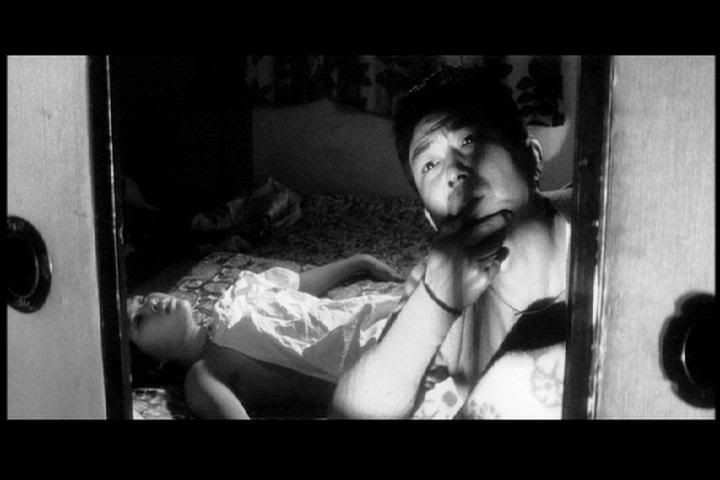
Shohei Imamura's The Pornographers is a pitch-black absurdist comedy of outrageous sexuality and the role of sex in a modern world dominated by greed and manipulation. The titular pornographer is Subu Ogata (Shoichi Ozawa), who makes porn movies and sells a wide variety of sexual literature, photos, illicit audio recordings, and impotence medicines — all this while telling his widowed lover and landlady Haru (Sumiko Sakamoto) that he sells medical equipment. In a way, to Ogata, this seems to be a true statement. He increasingly views the world, and especially the men in it, as sick with sexuality, and views his "immoral" work as a kind of cure.
Ogata's profession starts out as just a way to make money, but as he encounters police raids, local mobsters, thieving partners, and his own complicated sexual impulses, he becomes more philosophical about his work. In any case, it seems like it's stopped making him money, and he begins pouring all his own money into buying equipment and supplies, while his personal life descends into a labyrinth of forbidden and twisted sexual desire. He wants Haru's 15-year-old daughter Keiko (Keiko Sagawa), and Haru, who is sick and on the verge of dying, encourages him to marry her, though the promiscuous Keiko herself has little interest. Meanwhile, Haru tries to remain pure due to a vow she made to her first husband, who she believes has been reincarnated as a carp and watches over her — when the carp jumps in his tank, that means that her dead husband disapproves of her actions. There's also a bizarre Oedipal subtext with Haru's son Koichi (Masaomi Kondo), who she spoils and takes care of, and who responds with a devotion bordering uncomfortably on the sexual.
With these warped and intricately intertwined sexual impulses wending through its narrative, The Pornographers is structured as though the id is periodically overwhelming the story. Imamura's narrative will often run in a more or less traditional manner for a while, only to be disrupted by the intrusion of an unsettlingly real dream sequence. These strange dreams pop up from time to time without warning, often emerging spontaneously from scenes that at first appeared to be entirely realistic. It's never even made clear quite whose dreams they are, although presumably they might be attributed to Ogata. Certainly the later ones, with their imagery of sexual impotence, are his, but several earlier ones seem to belong more plausibly to Haru or her daughter. In any case, these absurd interjections add to the film's stylized depiction of sexual desire. It all culminates when Ogata becomes impotent and is driven to entirely reject human sexuality in its ordinary forms, pursuing the construction of a perfect mechanical woman to satisfy his desires.
The Pornographers is a unique and incredibly odd examination of sexuality in a world of greed and repression, where the human, personal aspect of sex is increasingly being subsumed by economics, legalities, and mechanical desire. As such, this 1966 film is a stunningly prescient work, predicting among other things the numbing of sexuality in the age of Internet porn and the continuing interaction between ordered sexual repression on the one hand and unfettered id on the other. The wild imagery is offset by the surprisingly philosophical commentary of Ogata's conversations with his fellow pornographers, in which they discuss the ethics of incest, the potential for the fantasies of porn to replace real-life violent sexuality, and the loss of one-on-one romantic and sexual connections in a world where sexuality has become a commonplace public spectacle and a commodity on the marketplace. Imamura's sensibility is perfectly suited to such a complex film, which treats its subject matter with both irreverence and depth.

No comments:
Post a Comment